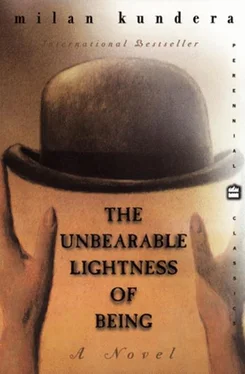Milan Kundera - The Unbearable Lightness of Being
Здесь есть возможность читать онлайн «Milan Kundera - The Unbearable Lightness of Being» весь текст электронной книги совершенно бесплатно (целиком полную версию без сокращений). В некоторых случаях можно слушать аудио, скачать через торрент в формате fb2 и присутствует краткое содержание. Жанр: Современная проза, на английском языке. Описание произведения, (предисловие) а так же отзывы посетителей доступны на портале библиотеки ЛибКат.
- Название:The Unbearable Lightness of Being
- Автор:
- Жанр:
- Год:неизвестен
- ISBN:нет данных
- Рейтинг книги:3 / 5. Голосов: 2
-
Избранное:Добавить в избранное
- Отзывы:
-
Ваша оценка:
- 60
- 1
- 2
- 3
- 4
- 5
The Unbearable Lightness of Being: краткое содержание, описание и аннотация
Предлагаем к чтению аннотацию, описание, краткое содержание или предисловие (зависит от того, что написал сам автор книги «The Unbearable Lightness of Being»). Если вы не нашли необходимую информацию о книге — напишите в комментариях, мы постараемся отыскать её.
The Unbearable Lightness of Being — читать онлайн бесплатно полную книгу (весь текст) целиком
Ниже представлен текст книги, разбитый по страницам. Система сохранения места последней прочитанной страницы, позволяет с удобством читать онлайн бесплатно книгу «The Unbearable Lightness of Being», без необходимости каждый раз заново искать на чём Вы остановились. Поставьте закладку, и сможете в любой момент перейти на страницу, на которой закончили чтение.
Интервал:
Закладка:
Looking out over the courtyard at the dirty walls, he realized he had no idea whether it was hysteria or love.
And he was distressed that in a situation where a real man would instantly have known how to act, he was vacillating and therefore depriving the most beautiful moments he had ever experienced (kneeling at her bed and thinking he would not survive her death) of their meaning.
He remained annoyed with himself until he realized that not knowing what he wanted was actually quite natural.
We can never know what to want, because, living only one life, we can neither compare it with our previous lives nor perfect it in our lives to come.
Was it better to be with Tereza or to remain alone?
There is no means of testing which decision is better, because there is no basis for comparison. We live everything as it comes, without warning, like an actor going on cold. And what can life be worth if the first rehearsal for life is life itself? That is why life is always like a sketch. No, sketch is not quite the word, because a sketch is an outline of something, the groundwork for a picture, whereas the sketch that is our life is a sketch for nothing, an outline with no picture.
Einmal ist keinmal, says Tomas to himself. What happens but once, says the German adage, might as well not have happened at all. If we have only one life to live,we might as well not have lived at all.
4
But then one day at the hospital, during a break between operations, a nurse called him to the telephone. He heard Tereza's voice coming from the receiver. She had phoned him from the railway station. He was overjoyed. Unfortunately, he had something on that evening and could not invite her to his place until the next day. The moment he hung up, he reproached himself for not telling her to go straight there. He had time enough to cancel his plans, after all! He tried to imagine what Tereza would do in Prague during the thirty-six long hours before they were to meet, and had half a mind to jump into his car and drive through the streets looking for her.
She arrived the next evening, a handbag dangling from her shoulder, looking more elegant than before. She had a thick book under her arm. It was Anna Karenina. She seemed in a good mood, even a little boisterous, and tried to make him think she had just happened to drop in, things had just worked out that way: she was in Prague on business, perhaps (at this point she became rather vague) to find a job.
Later, as they lay naked and spent side by side on the bed, he asked her where she was staying. It was night by then, and he offered to drive her there. Embarrassed, she answered that she still had to find a hotel and had left her suitcase at the station.
Only two days ago, he had feared that if he invited her to Prague she would offer him up her life. When she told him her suitcase was at the station, he immediately realized that the suitcase contained her life and that she had left it at the station only until she could offer it up to him.
The two of them got into his car, which was parked in front of the house, and drove to the station. There he claimed the suitcase (it was large and enormously heavy) and took it and her home.
How had he come to make such a sudden decision when for nearly a fortnight he had wavered so much that he could not even bring himself to send a postcard asking her how she was?
He himself was surprised. He had acted against his principles. Ten years earlier, when he had divorced his wife, he celebrated the event the way others celebrate a marriage. He understood he was not born to live side by side with any woman and could be fully himself only as a bachelor. He tried to design his life in such a way that no woman could move in with a suitcase. That was why his flat had only the one bed. Even though it was wide enough, Tomas would tell his mistresses that he was unable to fall asleep with anyone next to him, and drive them home after midnight. And so it was not the flu that kept him from sleeping with Tereza on her first visit. The first night he had slept in his large armchair, and the rest of that week he drove each night to the hospital, where he had a cot in his office.
But this time he fell asleep by her side. When he woke up the next morning, he found Tereza, who was still asleep, holding his hand. Could they have been hand in hand all night? It was hard to believe.
And while she breathed the deep breath of sleep and held his hand (firmly: he was unable to disengage it from her grip), the enormously heavy suitcase stood by the bed.
He refrained from loosening his hand from her grip for fear of waking her, and turned carefully on his side to observe her better.
Again it occurred to him that Tereza was a child put in a pitch-daubed bulrush basket and sent downstream. He couldn't very well let a basket with a child in it float down a stormy river! If the Pharaoh's daughter hadn't snatched the basket carrying little Moses from the waves, there would have been no Old Testament, no civilization as we now know it! How many ancient myths begin with the rescue of an abandoned child! If Polybus hadn't taken in the young Oedipus, Sophocles wouldn't have written his most beautiful tragedy!
Tomas did not realize at the time that metaphors are dangerous. Metaphors are not to be trifled with. A single metaphor can give birth to love.
5
He lived a scant two years with his wife, and they had a son. At the divorce proceedings, the judge awarded the infant to its mother and ordered Tomas to pay a third of his salary for its support. He also granted him the right to visit the boy every other week.
But each time Tomas was supposed to see him, the boy's mother found an excuse to keep him away. He soon realized that bringing them expensive gifts would make things a good deal easier, that he was expected to bribe the mother for the son's love. He saw a future of quixotic attempts to inculcate his views in the boy, views opposed in every way to the mother's. The very thought of it exhausted him. When, one Sunday, the boy's mother again canceled a scheduled visit, Tomas decided on the spur of the moment never to see him again.
Why should he feel more for that child, to whom he was bound by nothing but a single improvident night, than for any other? He would be scrupulous about paying support; he just didn't want anybody making him fight for his son in the name of paternal sentiments!
Needless to say, he found no sympathizers. His own parents condemned him roundly: if Tomas refused to take an interest in his son, then they, Tomas's parents, would no longer take an interest in theirs. They made a great show of maintaining good relations with their daughter-in-law and trumpeted their exemplary stance and sense of justice.
Thus in practically no time he managed to rid himself of wife, son, mother, and father. The only thing they bequeathed to him was a fear of women. Tomas desired but feared them. Needing to create a compromise between fear and desire, he devised what he called erotic friendship. He would tell his mistresses: the only relationship that can make both partners happy is one in which sentimentality has no place and neither partner makes any claim on the life and freedom of the other.
To ensure that erotic friendship never grew into the aggression of love, he would meet each of his long-term mistresses only at intervals. He considered this method flawless and propagated it among his friends: The important thing is to abide by the rule of threes. Either you see a woman three times in quick succession and then never again, or you maintain relations over the years but make sure that the rendezvous are at least three weeks apart.
The rule of threes enabled Tomas to keep intact his liaisons with some women while continuing to engage in short-term affairs with many others. He was not always understood. The woman who understood him best was Sabina. She was a painter. The reason I like you, she would say to him, is you're the complete opposite of kitsch. In the kingdom of kitsch you would be a monster.
Читать дальшеИнтервал:
Закладка:
Похожие книги на «The Unbearable Lightness of Being»
Представляем Вашему вниманию похожие книги на «The Unbearable Lightness of Being» списком для выбора. Мы отобрали схожую по названию и смыслу литературу в надежде предоставить читателям больше вариантов отыскать новые, интересные, ещё непрочитанные произведения.
Обсуждение, отзывы о книге «The Unbearable Lightness of Being» и просто собственные мнения читателей. Оставьте ваши комментарии, напишите, что Вы думаете о произведении, его смысле или главных героях. Укажите что конкретно понравилось, а что нет, и почему Вы так считаете.












